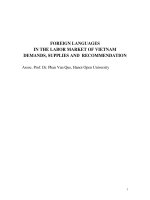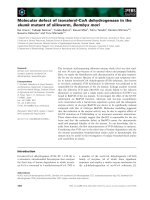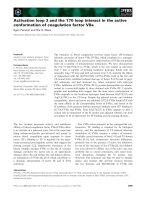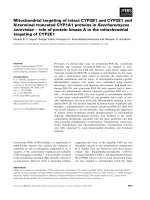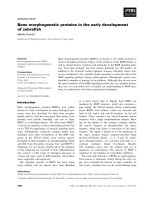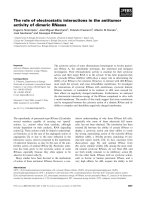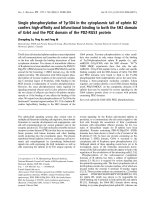agape in the selected works of thich nhat hanh implications on vietnamese students’ values (sum)
Bạn đang xem bản rút gọn của tài liệu. Xem và tải ngay bản đầy đủ của tài liệu tại đây (237.85 KB, 22 trang )
THAI NGUYEN UNIVERSITY BATANGAS STATE UNIVERSITY
Socialist Republic of Vietnam Republic of the Philippines
NGUYEN THUY LINH
AGAPE IN THE SELECTED WORKS OF THICH NHAT
HANH: IMPLICATION ON VIETNAMESE STUDENTS’
VALUES
Major: English Language and Literature
Ph.D DISSERTATION SUMMARY
OF ENGLISH LANGUAGE AND LITERATURE
Thai Nguyen 2014
2
The Dissertation was completed in:
THAI NGUYEN UNIVERSITY
Advisor: Dr.
Maria Luisa A. Valdez
Reviewer No.1:
Reviewer No.2:
Reviewer No.3:
The Dissertation will be evaluated at the State Council held at:
………………………………………………………………………
At: hour date month year 2014
Dissertation can be found at the libraries:
- National library of Vietnam;
- Learning Resource Center - Thai Nguyen University;
- Library of International Training and Development Center;
- Library of Batangas State University, Philippines.
1
Nowadays, while the human being strides on the path of
development towards the knowledge society, opened society, the
more "great risk" posed for the whole society, including the
degradation of ethics, lifestyle becoming a global problem. Sadly,
this situation occurs more frequently in young people, especially, in
pupils, and students - the future owners of the country. And Vietnam
is one of the countries which need to give the alarm about morality
and lifestyle. Facing requirements for sustainable development of the
country, Vietnam is necessary to build a new moral foundation in
order to be suitable for ages on the basis of inheriting the moral
values, the good traditional of the nation.
Born in India, spent nearly 20 centuries existence and
development of the nation, Buddhism has left a deep commitment of
thought and become really ingrained moral lifestyle of Vietnam
people because Buddhism is always appreciated as compassion,
charity. Since the transmission of Buddhism into Vietnam, the
helping rescue the spirit of Buddha is widely promoted in a country
where were affected by many war-torn, disasters. It is the important
reasons to tie to Buddhism and be accompanied with the Vietnamese
people through the long year.
The philosophy of loving-kindness, compassion, joy, and
equanimity encouraging human to live in a friendly and good way,
it is easy for Buddhism to take part in the heart of human beings in
order to perfect ethic personality, and create men to have lifestyle of
altruism, equality, charity. Nowadays, ethics and lifestyle of many
people are depressed with many manifestations of strange lifestyle,
contrary to the habits and customs of a community taking place
2
increasingly popular, especially in young people, pupils, students.
So, before the development requirements of the country, to build a
moral foundation - agape, new lifestyles towards the humanities, and
sustainable progress for the younger generation of pupils, students is
very necessary.
Thus, the theme of “ Agape in the selected works of Thich Nhat
Hanh: Implications on Vietnamese student values” is chosen to
study.
The structure of dissertation includes 5 chapters
3
CHAPTER I
INTRODUCTION
BACKGROUND OF STUDY
Men have made significant progress in science and technology,
but it is likely that people never feel miserable and anxious as today.
A series of complicated political situation of the world and the dark
side of the industry make the natural ecological environment and
humanistic environment be seriously polluted. Among these
challenges, increasing income gap, poverty reduction, rampant
corruption, and ethnic conflicts and growing religion have appeared.
In addition, natural disasters and climate change, the inequality of
women, and poor understanding of the law, and the potential threat
to growth and development of Asia countries in the future more and
more, and Vietnam also suffer more from these hazards. Thus, before
this situation, Buddhism has an important role to contribute to
support our country's security and to ensure social justice.
Buddhism, formed from the very beginning, has expressed relief
of suffering and mental distress for men. In the teachings of the
Buddha, people need to have agape - compassion and loving-
kindness. This is a fundamental factor to help develop agape or
compassion and relieve happiness suffering, leading to the
orientation of Buddhist activities for people. Thus, in the literature,
there are many works born and honestly reflect these phenomena.
And the writer named as Thich Nhat Hanh is mentioned. He has
considered as the one who was enlightening for people to enjoy the
4
pure life. Agape is valuable quality required of every man that Nhat
Hanh mentioned in the typical work of this study.
STATAMENT OF THE PROBLEM
The study primarily aims to identify the manifestations of agape
in selected works of Thich Nhat Hanh and their implications on
Vietnamese student values.
Specifically, this study seeks answers to the following questions:
1. What is the historical root of agape in the Buddhist Tradition?
2. How is the agape in the following works of Thich Nhat Hanh
manifested:
2.1 True Love: A Practical of Awakening the Heart; and
2.2 Being Peace?
3. How are the following virtues portrayed in the selected works in
terms of:
3.1 respect;
3.2 peace and;
3.3 service?
4.What social issues particularly focusing on the youth are gleaned
from the selections?
5. What are the implications of Thich Nhat Hanh’s agape on noted
Vietnamese students’ values?
5
SCOPE AND LIMITATION OF THE STUDY
This study analyzes of agape as embodied in the selected literary
pieces of Thich Nhat Hanh pointing out the events and situations
which show the implications of the writer’s agape on noted
Vietnamese students’ values. Likewise, this paper tries to present the
historical beginnings of agape in the Buddhist tradition; the virtues
of loving-kindness, compassion, joy and equanimity as the essence
of agape; the virtues of peace, respect and service as portrayed in the
selected works; the social issues particularly focused on the youth
gleaned from the selections; and the implications of the writer’s
agape on noted Vietnamese students’ values.
This study employed the qualitative method of research in
analyzing the Thich Nhat Hanh’s concept of agape in the
representative literary works chosen. Likewise, this analysis made
use of the sociological and philosophical approaches as the bases for
analysis. Other approaches in literary criticism that may be employed
in the analysis like the Formalist Criticism, Biographical Criticism,
Historical Criticism, and Psychological Criticism are not part of this
study.
This paper also involved content analysis, which is a systematic
technique in analyzing message content and message handling. The
data analysis in this research centered on pattern seeking and the
extraction of meaning from Thich Nhat Hanh’s selected literary
narrative or image data. Much effort was focused on the task of
recording data or making notes through concepts and categories;
altering or creating new codes or more subtle categories; linking and
6
combining abstract concepts; extracting the essence; organizing
meaning; creating theory from emerging themes; writing an
understanding; and drawing conclusions.
The essential features in the treatment of materials were
considered by the researcher in the conduct of this study. The general
rules cited by Stott (2014) as regards the seven standards a piece of
literature should abide to in order to be considered literary guided in
the selection of works under study.
The following representative literary works of Thich Nhat Hanh were
analyzed: Love Is Being There, Overcoming Pride, Interbeing,
Meditation in Daily Life, Feelings and Perceptions, Working for
Peace, Telephone Meditation, Everybody Should Practice
Mindfulness, The Heart of Practice, and The Three Gems, which are
all found in his masterpieces entitled True Love: A Practice of
Awakening the Heart, and Being Peace. The said selections were
chosen because of the correlation between the aforementioned
themes, literary devices, the social issues particularly focused on the
youth gleaned from the selections, which helped in unveiling the
implications of the writer’s agape on noted Vietnamese students’
values.
SIGNIFICATION OF THE STUDY
The relevance of literary analysis as an essential part of a research
study is highlighted in terms of its significance to a number of
individuals. Therefore, it is vital to expound how this study is
beneficial to academic managers, working professionals, college
7
instructors of literature, students of literature, members of the
community, and other researchers.
Viet Nam’s Ministry of Education and Training and
Educational Institutions: employ this study to ensure that the
practice of agape can access the academe and spawn activities in the
curricula that will educate pupils, students the traditional moral
values of the Vietnamese people from social evils, environmental
degradation, war, violence, social injustice and human rights abuses.
Vietnamese students: can be utilized as the reference source for,
and to help students to realize agape which is always seen as the very
important factor in life. The value of true love, peace, respect and
service for each other to create the atmosphere of peace and warmth
for themselves and for society are performed by learners.
The members of the community: can realize the value of agape
or compassion while living, learning and working in every society or
nation. The results of the study also shows that practicing four
immeasurable minds brings a peace and happiness life for man.
8
CHAPTER II
REVIEW OF RELATED LITERATURE
This chapter is presented with the end view of identifying the
constructs of the study.
RESEARCH LITERATURE
This section presents the published and unpublished researches
that are related to the present study.
SYNTHEIS OF LITERATURE REVIEWED
This section justifies the direct bearing of the conceptual literature
to the present study followed by the presentation of the similarities
and differences of the cited research literature to the present study.
CONCEPTUAL FRAMEWORK
This section presents the central theme or the main thrust of the
study. It serves as a guide in conducting the investigation. It is
followed by a paradigm which is a diagrammatic representation of
the conceptual framework.
DEFINITION OF TERMS
This section presents the terms defined conceptually and
operationally for a better understanding and appreciation of concepts
as they are used in the study. The following terms were defined:
agape, compassion, content analysis, joy, equanimity, peace, respect,
selected works of Thich Nhat Hanh, service, social issues, and
Vietnamese values.
9
CHAPTER III
RESEARCH METHODOLOGY
This chapter presents the research methodology in terms of the
research design and treatment of the materials studied.
RESEARCH DESIGN
This study employed the qualitative method of research in
analyzing the tenets of agape in the representative literary works
chosen. According to Suter (2012), qualitative research is directed by
the philosophical premise that one must consider the multiple
realities experienced by the participants themselves to understand a
complex phenomenon. These multiple realities experienced by the
participants can be reflected in various ways, including the literary
genre called wisdom stories, meditations, anecdotes, life coaching
advices, and poems.
According to Ary, et. al. (2006), human experiences take their
signification from social, cultural and political influences, and are
therefore incapable of being separated to the said influences. Hence,
in analyzing the representative literary works, the tenet of agape in
the context of Buddhism in Vietnam are considered. These provided
substantial and significant interpretations of the author’s and
characters’ motivations as regards agape.
Patton (2002) pointed out that the goal of qualitative data analysis
is to uncover emerging themes, patterns, concepts, insights, and
understanding.
10
The data analysis in this research centered on pattern seeking and
the extraction of meaning from Thich Nhat Hanh’s selected literary
narrative or image data. Much effort was focused on the task of
recording data or making notes through concepts and categories;
altering or creating new codes or more subtle categories; linking and
combining abstract concepts; extracting the essence; organizing
meaning; creating theory from emerging themes; writing an
understanding; and drawing conclusions.
TREATMENT OF MATERIALS
The essential features in the treatment of materials were
considered by the researcher in the conduct of this study.
Literature, like all the other arts, has certain standards by which
all selections can be measured for evaluation and analysis. In this
study, the general rules cited by Stott (2014) as regards the seven
standards a piece of literature should abide to in order to be
considered literary guided in the selection of works under study.
According to him, these standards include: universal appeal,
permanence, suggestiveness, intellectually valuable, spiritually
valuable, style and artistry.
Through his being and his works, Nhat Hanh invites readers into
the reality of the present moment. Because he is a poet, his language
has beauty, intimacy, and rich texture that illuminate the mind.
Because he is courageous, he willingly pierces the reader’s great
heart of compassion. Because he is wise, his simple words speak to
the most obvious Dharma and to the truly profound levels of
Buddha’s awakening, all at one time (Kornfield, 2005).
11
For the purpose of this study and to give philosophical credibility,
the representative literary works were analyzed: Love Is Being There,
Overcoming Pride, Interbeing, Meditation in Daily Life, Feelings
and Perceptions, Working for Peace, Telephone Meditation,
Everybody Should Practice Mindfulness, The Heart of Practice, and
The Three Gems, which are all found in his masterpieces entitled
True Love: A Practice of Awakening the Heart, and Being Peace. For
over half a century, this revolutionary monk has spread the teachings
of Being Peace (Kornfield, 2005) and True Love: A Practice of
Awakening the Heart.
From these literatures, readers will be able to see in them the
seeds of all Thich Nhat Hanh’s most important teachings, and the
seeds of man’s awakening as well. Likewise, they may draw on
simple Buddhist teachings; wisdom stories from various traditions;
guided meditation practices and experiences of practices; gentle
anecdotes and life coaching advises and teachings of this reverend
Zen master to illustrate how each individual can cultivate loving-
kindness, compassion, joy and equanimity. These prose and poetry
constituted the primary and twining sources of the study. They were
chosen to parallel the criteria spelled out for the purpose. These
works have been taken up in critical analysis far less frequently than
the author’s most popular books entitled “The Heart of Buddha’s
Teaching, Peace Is Every Step: The Path of Mindfulness in Everyday
Life, The Miracle of Mindfulness; and Happiness: Essential
Mindfulness Practices, Call Me by my True Names, Old Path White
Clouds: Walking in the Footsteps of Buddha, Living Buddha, Living
Christ, You are Here: Discovering the Present of the Magic Moment,
and Mindful Movements: Ten Exercises for Well-Being.
12
CHAPTER IV
FINDINGS AND PRESENTATION
FINDINGS
The results of analysis and interpretation revealed that:
1. The historical root of agape in the Buddhist Tradition
The root of agape in the Buddhist religion started with the birth
of Buddha Shakyamuni as a royal prince in 624 BC in a place called
Lumbini, which was originally in Northern India but is now part of
Nepal. “Shakya” is the name of the royal family into which he was
born, and “Muni” means “Able One.” His parents gave him the
name Siddharta and there were many wonderful predictions about his
future. In his early years, he lived as a prince in his royal palace but
when he was 29 years old, he retired to a forest where he followed a
life of spiritual meditation.
His intention in founding Buddhism was to lead living beings to
permanent liberation from suffering because he realized that
temporary liberation from suffering and difficulties is not enough.
Motivated by love and compassion, his aim was to help living beings
find lasting love or nirvana.
Historically, agape is one of the basic founding principles of
Buddhism. Motivated by love and compassion, the founder of
Buddhism strived to help others find love. This clearly states the
early stint of unselfish, unrequited love, agape love, in the early days
of Buddhism.
Buddhism, formed from the very beginning, has expressed relief
of suffering and mental distress for men. In the teachings of the
Buddha, people need to have agape - compassion and loving-
13
kindness. This is a fundamental factor to help develop agape or
compassion and relieve happiness suffering, leading to the
orientation of Buddhist activities for people. Thus, one can already
see the emergence of this virtue in the historical pages of Buddhism.
2. The agape in the following works of Thich Nhat Hanh
manifested
In the Buddhist tradition, the teachings on agape or true love
offered by the Buddha are called the four Brahmaviharas. The word
“vihara” is used to refer to an abode or a dwelling place and the
word “brahmavihara” means dwelling place of the God Brahma.
ThichNhatHanh (2011) and Ward and Ward (2008), called these
teachings the four immeasurable namely: loving-kindness or maitri,
compassion orkaruna, joy or mudita, and equanimity or upeksha.
They are said to be the four aspects of true love within every man
and everything. They are referred to as “immeasurable” because of
the belief that if men practice these virtues, the love in their hearts
will grow so much that it cannot be measured.
From the selected literary pieces, readers can glean Thich Nhat
Hanh’s portrayal of how the practice of the immeasurable mind of
loving-kindness extinguishes anger in the hearts of living beings; the
practice of the immeasurable mind of compassion eliminates all
sorrows and anxieties in the hearts of living-beings; the practice of
immeasurable mind of joy removes sadness and joylessness in the
hearts of living beings; and the practice of immeasurable mind of
equanimity puts an end to hatred, aversion, and attachment in the
heart of living beings.
14
3. The virtues as respect, peace and service portrayed in the
selected works.
From the selections, Nhat Hanh’s concepts of the virtues of
peace, respect, and service were also portrayed. This Zen Buddhist
monk is convinced that everybody can practice mindfulness, inner
peace, deep listening and loving speech not only for the sake of their
own inner peace and happiness but for the other people as well.
Another virtue which is portrayed in the selected works is respect or
reverence. Such respect recognizes and honours the presence of the
sacred in everything - the bodies, other people, animals, species, or
nature. Respect is also an attitude men should have toward personal
possessions, those of others, or things in the neighbourhood, village,
community and surrounding landscape. The virtue of service is
likewise portrayed in the identified works. Nhat Hanh believed that
service does not start when people have something to give - it
springs naturally when they have nothing left to take. They start to
do their part - initially, by becoming mindful of the offerings and
services they receive, then by feeling grateful for them, and finally
by continuing to pay forward their blessings with a joyful heart.
Service, for him means awareness or knowing what is going on. Nhat
Hanh emphasized that when a group of people manifest the virtues of
peace, respect and perform a kind of service as a practice, it creates
an ecosystem that holds a space, allowing value to emerge
organically. All of these indirect values, the ripple effect, have space
and time to add up, synergize with other ripples, and multiply into
something completely unexpected.
15
4. The social issues particularly focusing on the youth are
gleaned from the selections indented
There are social issues particularly focused and have affected the
youth.
That poverty is still existed on man, and children has affected
seriously. Gender equality and women's rights still occur in the new
era. In most cultures, women often suffer injustice. The lives of
human beings who have suffered oppression injustice, misery,
poverty, separated. Women should never be as equal as men in
society. In addition, environmental degradation is serious problem in
society, water pollution, deforestation and animal and industrial
wastes. It directly affects the health and lifestyles of the other people.
While on the other hand, war, violence still occurs. For this reason, it
is very important for the youth to take part in engaged Buddhism to
avoid social problems that violate the norms and values of the
Vietnam society.
5. The Implications of Thich Nhat Hanh’s Agape on Noted
Vietnamese Values.
The gentle and simple tone of Thich Nhat Hanh’s literature is an
embodiment of the Vietnamese culture and way of life as well. In the
analysis of his writings, it can be gleaned that the central theme of
agape, its facets, principles and related concepts, bore relation to
noted Vietnamese values and customs as well. Nhat Hanh captured
the true essence of agape in his selected works. The context of his
works analyzed all showed the search of man for peace, compassion
and love in a world where great changes are happening. In the same
way, the world of Vietnamese people and their society is undergoing
drastic changes too.
16
Nhat Hanh’s agape, comprised of respect and peace, and service
reflect the heart and soul of the Vietnamese people’s spirit. The
unyielding attitude of these people against major challenges
characterizes the compassion of the people for each other, concerned
for the welfare of their kinsmen.
Thus, through the selected works, the Vietnamese people,
especially teenagers realize that agape or compassion plays an
important role in life because it has left the depth of thought and
become really ingrained moral lifestyle of the Vietnamese people.
Concurrently, the practice of four immeasurable minds help men
perfect moral personality, give them to altruism lifestyle, equality,
charity.
17
CHAPTER V
SUMMARY, FINDINGS, CONCLUSIONS AND
RECOMMENDATIONS
SUMMARY
The study attempted to analyze Thich Nhat Hanh’s two selected
works entitled True Love: A Practice of Awakening the Heart and
Being Peace, pointing out events and situations on how the agape is
reflected in these works. Likewise, this study tries to present how the
selected works of Thich Nhat Hanh manifest the meaning of respect,
peace, and service; and to show the social issues particularly focused
on the youth; and to bring about from these works the implications of
agape on Vietnamese students’ values. This dissertation was guided
by the idea that literature can be a writer’s channel for conveying the
philosophical dimension of agape.
This study employed the qualitative method of research in
analyzing the tenets of agape in the representative literary works
chosen. This study also this analysis made use of the sociological
and philosophical approaches as the bases for analysis.
For the purpose of this study and to give philosophical credibility,
the representative literary works were analyzed: Love Is Being There,
Overcoming Pride, Interbeing, Meditation in Daily Life, Feelings
and Perceptions, Working for Peace, Telephone Meditation,
Everybody Should Practice Mindfulness, The Heart of Practice, and
The Three Gems, which are all found in his masterpieces entitled
True Love: A Practice of Awakening the Heart, and Being Peace.
18
FINDINGS
The study yielded the following findings
1. The root of agape in the Buddhist religion started with the birth of
Buddha Shakyamuni. Buddhism, formed from the very beginning,
has expressed relief of suffering and mental distress for men. In the
teachings of the Buddha, people need to have agape - compassion
and loving-kindness. This is a fundamental factor to help develop
agape or compassion and relieve happiness suffering, leading to the
orientation of Buddhist activities for people. Thus, one can already
see the emergence of this virtue in the historical pages of Buddhism.
2. From the selected literary pieces, readers can glean Thich Nhat
Hanh’s portrayal of how the practice of the immeasurable mind of
loving-kindness extinguishes anger in the hearts of living beings; the
practice of the immeasurable mind of compassion eliminates all
sorrows and anxieties in the hearts of living-beings; the practice of
immeasurable mind of joy removes sadness and joylessness in the
hearts of living beings; and the practice of immeasurable mind of
equanimity puts an end to hatred, aversion, and attachment in the
heart of living beings.
3. From the selections, Nhat Hanh’s concepts of the virtues of peace,
respect, and service were also portrayed. Nhat Hanh believes that all
these qualities help a prosperous society, happiness, and less
miserable.
4.
There are social issues particularly focused and have affected the
youth. These include poverty, environmental degradation, war,
19
violence, equality or discrimination, social injustice, and suppression
of human rights. It is very important for the youth to take part in
engaged Buddhism to avoid social problems that violate the norms
and values of the Vietnam society
.
5. Through the selected works, the Vietnamese people, especially
teenagers realize that agape or compassion plays an important role in
life because it has left the depth of thought and become really
ingrained moral lifestyle of the Vietnamese people. Concurrently,
the practice of four immeasurable minds help men perfect moral
personality, give them to altruism lifestyle, equality, charity.
CONCLUSIONS
Based on the findings and interpretations
of the study, the
following conclusions are drawn:
1.
The historical root of agape can be traced back to the early days of
Buddhism and is manifested in many teachings of the said religion.
2. From the selected literary pieces, Thich Nhat Hanh elaborated on
the Four Immeasurable Minds known as loving-kindness,
compassion, joy and equanimity as concrete expressions of man’s
deepest love.
3. Nhat Hanh emphasized that when a group of people manifest the
virtues of peace, respect and perform a kind of service as a practice,
it creates an ecosystem that holds a space, allowing value to emerge
organically. All of these indirect values, the ripple effect, have space
20
and time to add up, synergize with other ripples, and multiply into
something completely unexpected.
4. There are social issues particularly focused and have affected the
youth. These include poverty, environmental degradation, war,
violence, equality or discrimination, social injustice, and suppression
of human rights. It is very important for the youth to take part in
engaged Buddhism to avoid social problems that violate the norms
and values of the Vietnam society.
5. Research has also shown that practicing four immeasurable minds
daily to help people curb greed, hatred and delusion to have the
peaceful mind.
RECOMMENDATION FOR FURTHER STUDIES
From the foregoing findings and conclusions, the researcher
offers the following recommendations:
- Further and wider research or expanding the scope of the study
order to look at the philosophy comprehensively and the radical
Buddhist ethics aim to initiate, user-friendly human.
- The further development of this study about Buddhism is to
propose solutions to eliminate social evils in society, especially the
youth.

